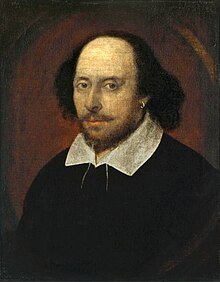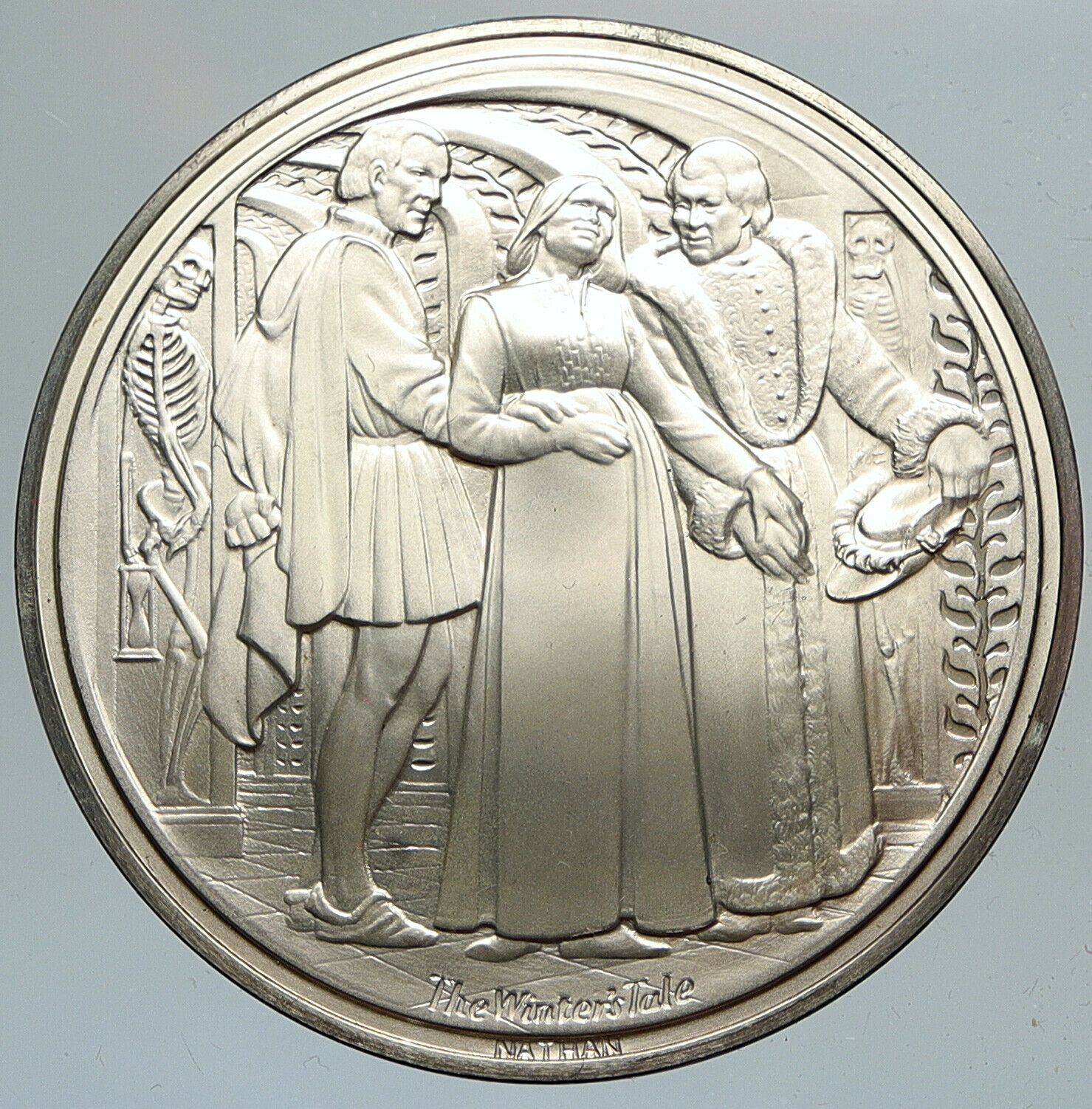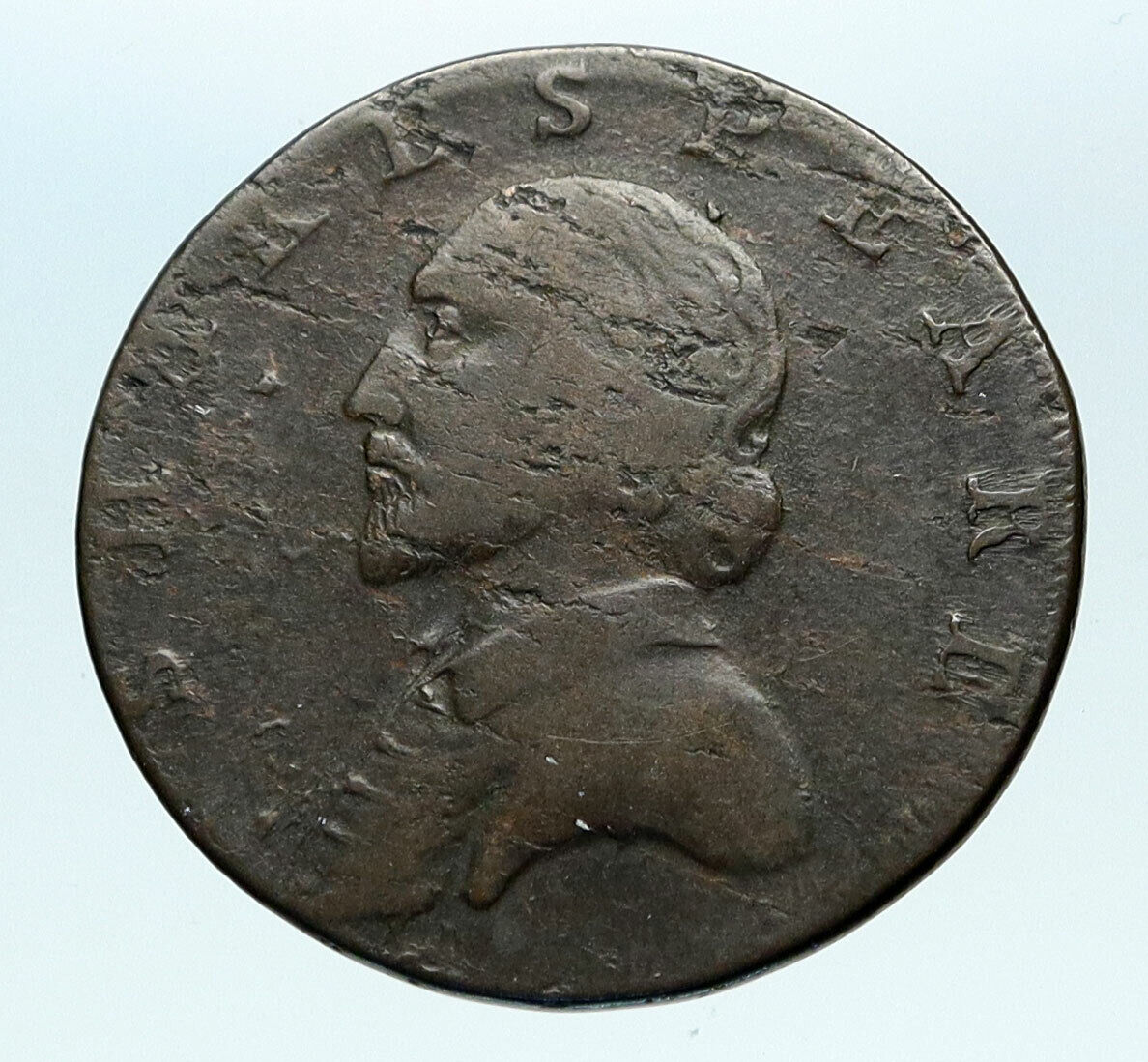|
England – Great Britain
William Shakespeare – Royal Shakespeare Company – The Life of Henry V
1973 Proof Silver Medal 44mm (40.12 grams) .925 Silver (1.2 oz. ASW)
Reference: John Pinches 71 | Engraver: Philip Nathan
Henry V II NATHAN, Scene with crowned man on horseback, archer kneeling left, swordsman guiding horse, army lined up behind.
*RSC* ROYAL SHAKESPEARE COMPANY STRATFORD UPON AVON LONDON We few, we happy few, we band of brothers. HENRY V ACT IV, SCENE III, Logo with swan atop, flowering wreath around.
Edge Lettering:
STERLING JP 71P
You are bidding on the exact item pictured, provided with a Certificate of Authenticity and Lifetime Guarantee of Authenticity.
 William Shakespeare (bapt. 26 April 1564 – 23 April 1616) was an English poet, playwright, and actor, widely regarded as the greatest writer in the English language and the world’s greatest dramatist. He is often called England’s national poet and the “Bard of Avon”. His extant works, including collaborations, consist of some 39 plays, 154 sonnets, two long narrative poems, and a few other verses, some of uncertain authorship. His plays have been translated into every major living language and are performed more often than those of any other playwright. William Shakespeare (bapt. 26 April 1564 – 23 April 1616) was an English poet, playwright, and actor, widely regarded as the greatest writer in the English language and the world’s greatest dramatist. He is often called England’s national poet and the “Bard of Avon”. His extant works, including collaborations, consist of some 39 plays, 154 sonnets, two long narrative poems, and a few other verses, some of uncertain authorship. His plays have been translated into every major living language and are performed more often than those of any other playwright.
Shakespeare was born and raised in Stratford-upon-Avon, Warwickshire. At the age of 18, he married Anne Hathaway, with whom he had three children: Susanna and twins Hamnet and Judith. Sometime between 1585 and 1592, he began a successful career in London as an actor, writer, and part-owner of a playing company called the Lord Chamberlain’s Men, later known as the King’s Men. At age 49 (around 1613), he appears to have retired to Stratford, where he died three years later. Few records of Shakespeare’s private life survive; this has stimulated considerable speculation about such matters as his physical appearance, his sexuality, his religious beliefs, and whether the works attributed to him were written by others. Such theories are often criticised for failing to adequately note that few records survive of most commoners of the period.
Shakespeare produced most of his known works between 1589 and 1613. His early plays were primarily comedies and histories and are regarded as some of the best work produced in these genres. Until about 1608, he wrote mainly tragedies, among them Hamlet, Othello, King Lear, and Macbeth, all considered to be among the finest works in the English language. In the last phase of his life, he wrote tragicomedies (also known as romances) and collaborated with other playwrights.
 Many of Shakespeare’s plays were published in editions of varying quality and accuracy in his lifetime. However, in 1623, two fellow actors and friends of Shakespeare’s, John Heminges and Henry Condell, published a more definitive text known as the First Folio, a posthumous collected edition of Shakespeare’s dramatic works that included all but two of his plays. The volume was prefaced with a poem by Ben Jonson, in which Jonson presciently hails Shakespeare in a now-famous quote as “not of an age, but for all time”. Many of Shakespeare’s plays were published in editions of varying quality and accuracy in his lifetime. However, in 1623, two fellow actors and friends of Shakespeare’s, John Heminges and Henry Condell, published a more definitive text known as the First Folio, a posthumous collected edition of Shakespeare’s dramatic works that included all but two of his plays. The volume was prefaced with a poem by Ben Jonson, in which Jonson presciently hails Shakespeare in a now-famous quote as “not of an age, but for all time”.
Throughout the 20th and 21st centuries, Shakespeare’s works have been continually adapted and rediscovered by new movements in scholarship and performance. His plays remain popular and are studied, performed, and reinterpreted through various cultural and political contexts around the world.
 The Royal Shakespeare Company (RSC) is a major British theatre company, based in Stratford-upon-Avon, Warwickshire, England. The company employs over 1,000 staff and produces around 20 productions a year. The RSC plays regularly in London, Stratford-upon-Avon, and on tour across the UK and internationally. The Royal Shakespeare Company (RSC) is a major British theatre company, based in Stratford-upon-Avon, Warwickshire, England. The company employs over 1,000 staff and produces around 20 productions a year. The RSC plays regularly in London, Stratford-upon-Avon, and on tour across the UK and internationally.
The company’s home is in Stratford-upon-Avon, where it has redeveloped its Royal Shakespeare and Swan theatres as part of a £112.8-million “Transformation” project. The theatres re-opened in November 2010, having closed in 2007. The new buildings attracted 18,000 visitors within the first week and received a positive media response both upon opening, and following the first full Shakespeare performances. Performances in Stratford-upon-Avon continued throughout the Transformation project at the temporary Courtyard Theatre.
As well as the plays of Shakespeare and his contemporaries, the RSC produces new work from living artists and develops creative links with theatre-makers from around the world, as well as working with teachers to inspire a lifelong love of William Shakespeare in young people and running events for everyone to explore and participate in its work.
The RSC celebrated its fiftieth birthday season from April–December 2011, with two companies of actors presenting the first productions designed specifically for the new Royal Shakespeare and Swan Theatre stages. The 2011-season began with performances of Macbeth and a re-imagined lost play The History of Cardenio. The fiftieth birthday season also featured The Merchant of Venice with Sir Patrick Stewart and revivals of some of the RSC’s greatest plays, including a new staging of Marat/Sade. For the London 2012 Festival as part of the Cultural Olympiad, the RSC produced the World Shakespeare Festival, featuring artists from across the world performing in venues around the UK. In 2013, the company began live screenings of its Shakespeare productions – called Live from Stratford-upon-Avon – which are screened around the world. In 2016, the company collaborated with Intel and The Imaginarium Studios to stage The Tempest, bringing performance capture to the Royal Shakespeare Theatre for the first time.
|





 William Shakespeare (bapt. 26 April 1564 – 23 April 1616) was an English poet, playwright, and actor, widely regarded as the greatest writer in the English language and the world’s greatest dramatist. He is often called England’s national poet and the “Bard of Avon”. His extant works, including collaborations, consist of some 39 plays, 154 sonnets, two long narrative poems, and a few other verses, some of uncertain authorship. His plays have been translated into every major living language and are performed more often than those of any other playwright.
William Shakespeare (bapt. 26 April 1564 – 23 April 1616) was an English poet, playwright, and actor, widely regarded as the greatest writer in the English language and the world’s greatest dramatist. He is often called England’s national poet and the “Bard of Avon”. His extant works, including collaborations, consist of some 39 plays, 154 sonnets, two long narrative poems, and a few other verses, some of uncertain authorship. His plays have been translated into every major living language and are performed more often than those of any other playwright.  Many of Shakespeare’s plays were published in editions of varying quality and accuracy in his lifetime. However, in 1623, two fellow actors and friends of Shakespeare’s, John Heminges and Henry Condell, published a more definitive text known as the First Folio, a posthumous collected edition of Shakespeare’s dramatic works that included all but two of his plays. The volume was prefaced with a poem by Ben Jonson, in which Jonson presciently hails Shakespeare in a now-famous quote as “not of an age, but for all time”.
Many of Shakespeare’s plays were published in editions of varying quality and accuracy in his lifetime. However, in 1623, two fellow actors and friends of Shakespeare’s, John Heminges and Henry Condell, published a more definitive text known as the First Folio, a posthumous collected edition of Shakespeare’s dramatic works that included all but two of his plays. The volume was prefaced with a poem by Ben Jonson, in which Jonson presciently hails Shakespeare in a now-famous quote as “not of an age, but for all time”.  The Royal Shakespeare Company (RSC) is a major British theatre company, based in Stratford-upon-Avon, Warwickshire, England. The company employs over 1,000 staff and produces around 20 productions a year. The RSC plays regularly in London, Stratford-upon-Avon, and on tour across the UK and internationally.
The Royal Shakespeare Company (RSC) is a major British theatre company, based in Stratford-upon-Avon, Warwickshire, England. The company employs over 1,000 staff and produces around 20 productions a year. The RSC plays regularly in London, Stratford-upon-Avon, and on tour across the UK and internationally.




